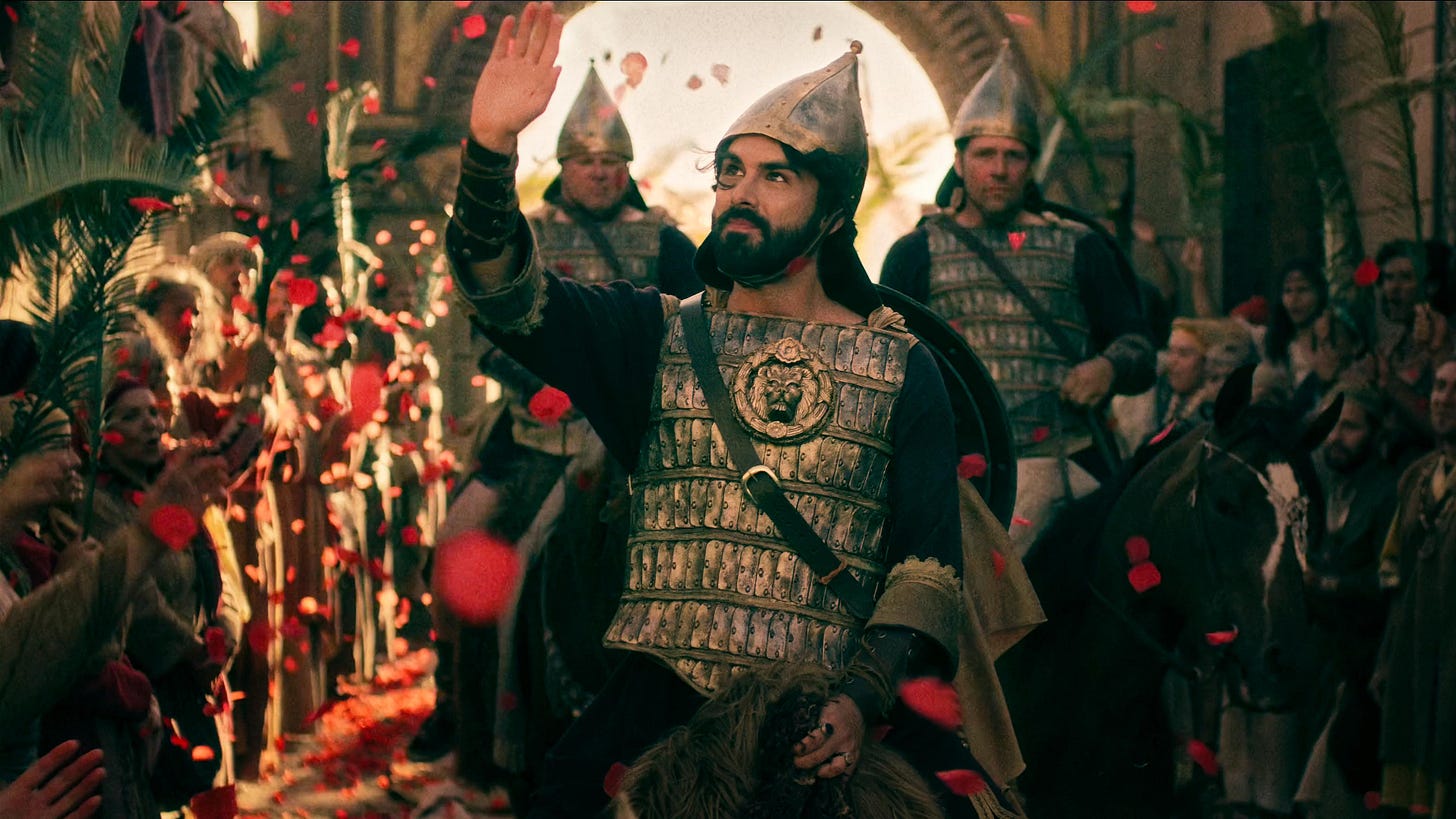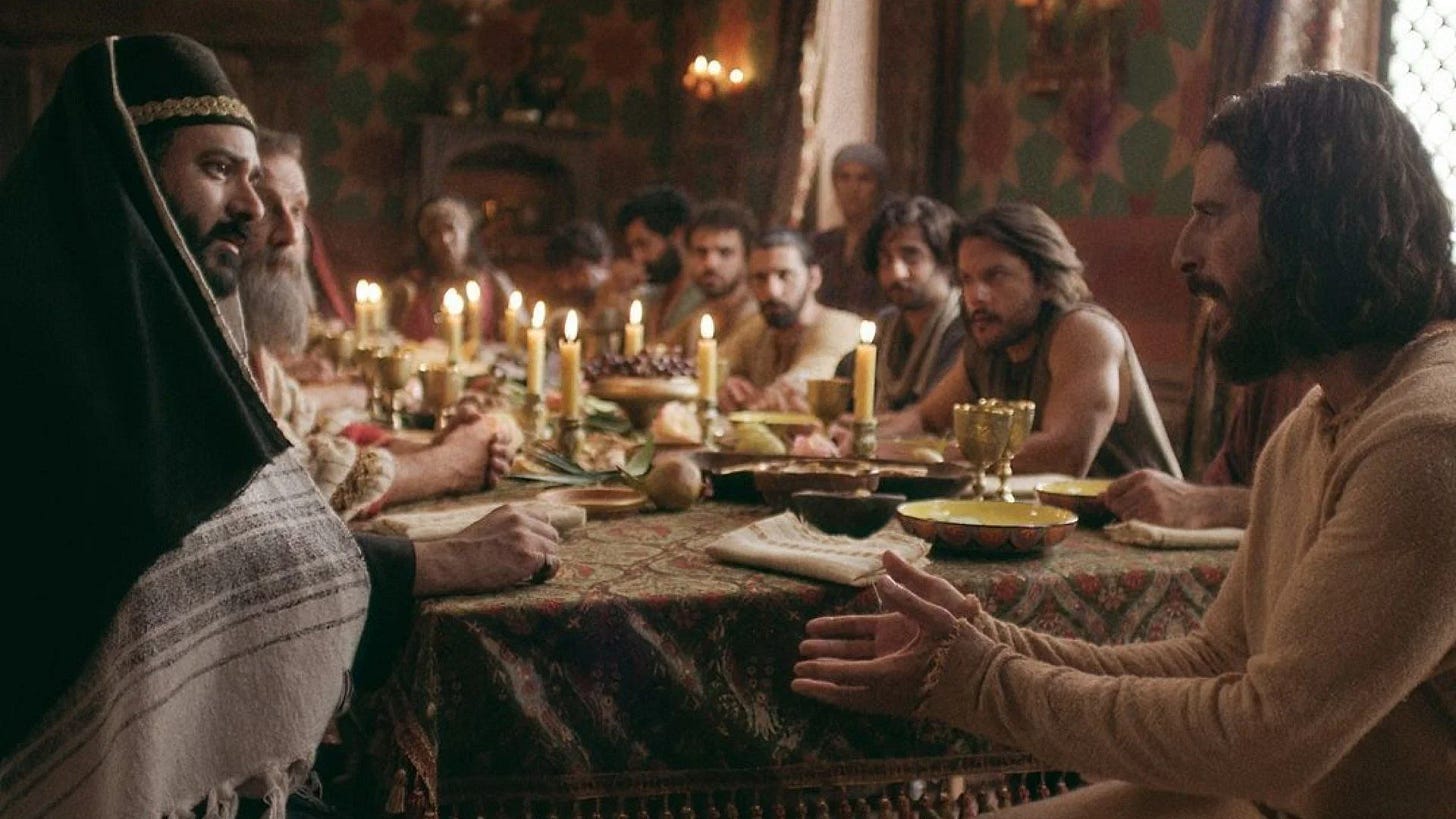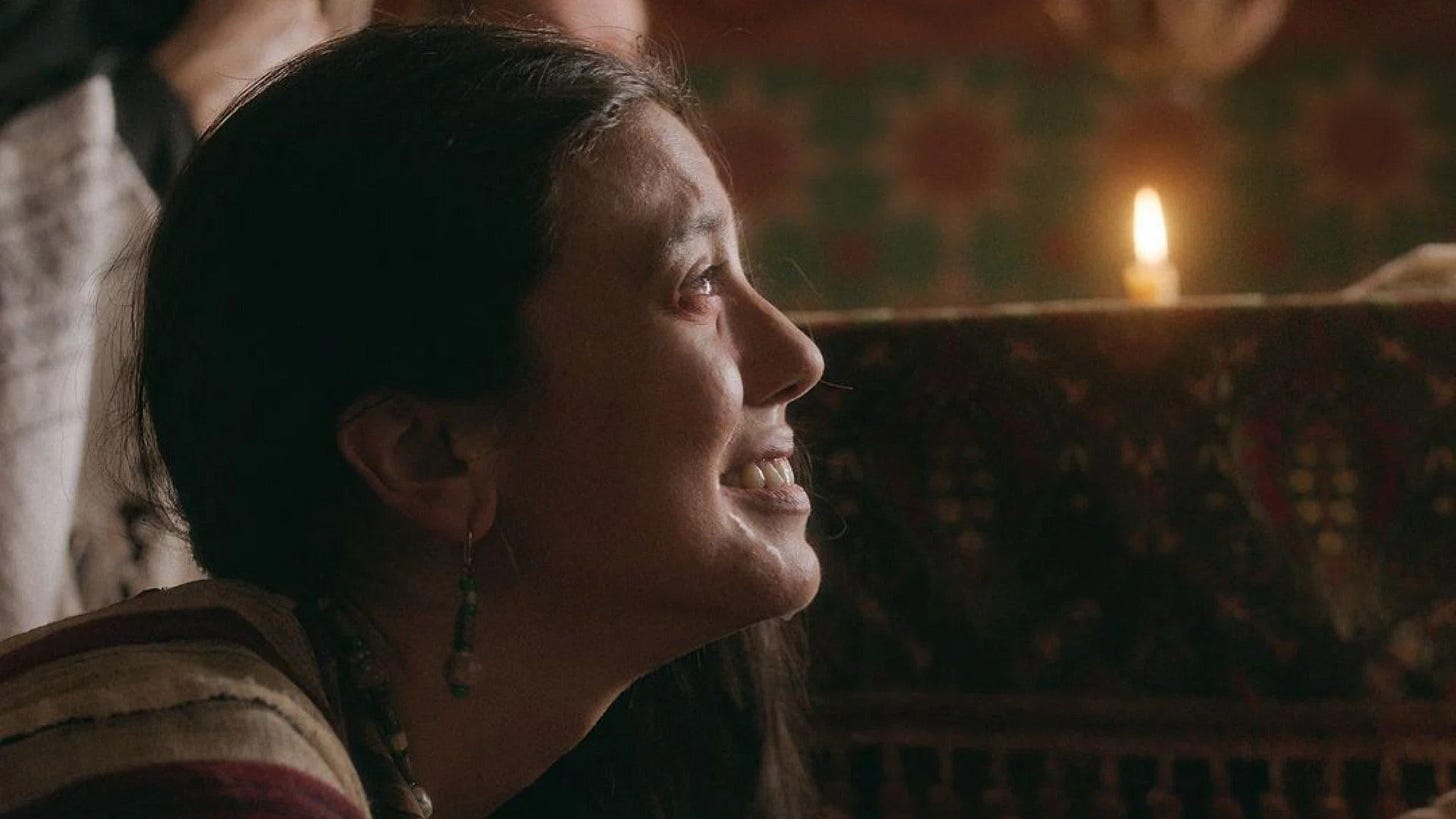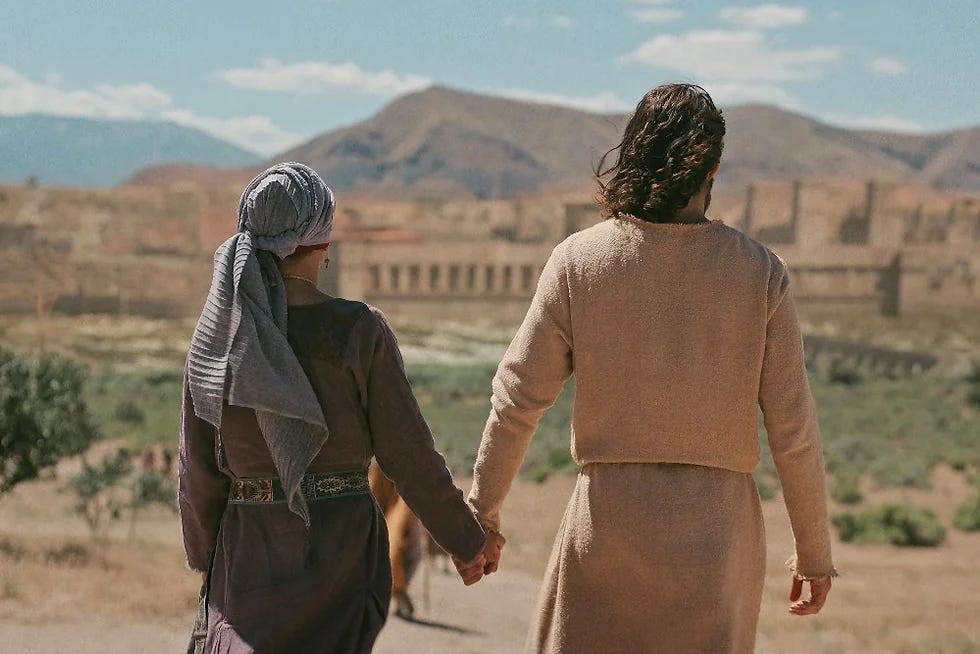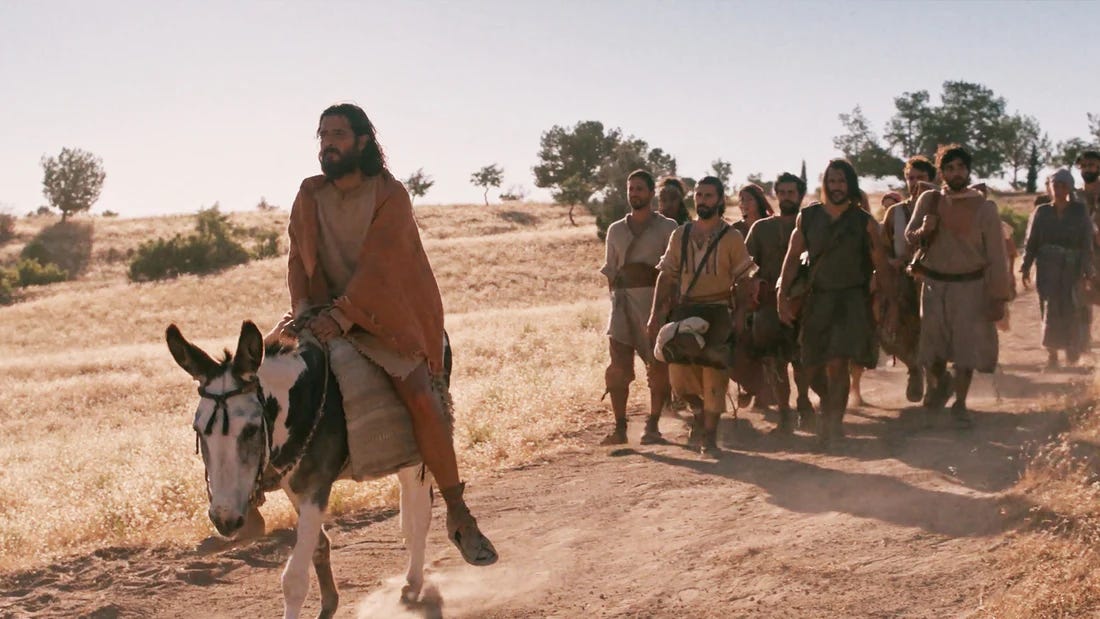Summary
Hosanna! Our king is victorious!
These are the words of the song sung by the people of Jerusalem welcome King David into the city. They shower him with flower petals, wave palm branches, and lay their cloaks down on the road before their beloved king. David takes his son, Daniel, to anoint the Passover lamb before bringing him into their home. The spotless, one-year-old lamb becomes a household pet while David and Abigail tell Daniel some Passover stories including how David has kept a family heirloom, a bridle.
Zee’s brother and Veronica are testifying to Jesus’s healing miracles outside the temple while being challenged by the Sadducees. The people do not care about the dispute and demand to hear more about Jesus. The city is filled with pilgrims that have come for The Passover, and Pilate whimsically contemplates the tradition of the Jewish people before becoming distracted with the tale of Lazarus’s resurrection. He is quick to dismiss the tale as superstitious nonsense until Atticus reveals he is much less certain. At that realization, Pilate reflects that Caiaphas’s concern warrants his more serious approach to the manner.
Amidst the hustle, we find Mary, Lazarus’s sister shopping at a perfume vendor. After being unimpressed by some of the cheaper wares, Mary asks for the finest perfume she has and purchases the entire jar for an entire year’s wages as it is meant “for the most important king the world has ever known.” While Mary is preparing to anoint the King of Kings, the Sanhedrin debates about what is to be done with Jesus as his presence becomes an ever-growing threat to the leaders. Shmuel attempts to ask Caiaphas for permission to question Jesus personally, but Caiaphas believes that Jesus’s death at the hands of the Romans is the only solution to their problem. Shmuel and Yussif discuss what the appropriate next step might be following this concerning statement from the high priest. They determine their only option is to seek an audience with Jesus if possible.
We see Judas stealing some money from the money bag before following Thomas as he departs Lazarus’s house to bury some personal items along a path. Later, Jesus is eating with his followers around Lazarus’s table when Shmuel and Yussif arrive to speak with him. Judas is excited about the powerful alliance that Jesus could form with the Sanhedrin. Jesus answers Shmuel’s initial questions by asking him what he expects he hopes for and plans to do when the Messiah comes. He hopes to be helpful in the reuniting of the Jewish people against the Roman oppressors. Jesus responds by teaching the parable of the sheep and the goats. Shmuel is caught off guard that the Messiah will identify with the poor and stranger. Shmuel is also concerned that the distinguishing aspects of Jewish life will be done away with as Christ fulfills the law.
The conversation halts when Mary arrives with the spikenard and softly weeps as she approaches Jesus. She falls at His feet, opens the jar, anoints His feet, and dries them with her hair. Shmuel becomes more outraged as this unfolds and demands for Lazarus, Jesus, or somebody to object to the indecency and wastefulness of Mary’s actions. The only person who shares his sentiment is Judas who rises from the table and scolds Mary. Jesus rebukes Judas and Shmuel explaining that her actions do not contradict the need to care for the poor as they will always be there, but He has been anointed for burial. Several disciples are disturbed by this final statement, but the meal ceases as Shmuel exclaims he wanted to believe in Jesus but cannot after this abomination.
Pilate and Herod are discussing the size of the crowd for Passover this year as being abnormally large due to the interest in Jesus. After prodding Herod that he has heard the title “new king” be used to describe Jesus, he quickly turns to conversation to Lazarus but is not so excited to hear Herod say that the claim is under investigation by Caiaphas. Herod warns that if the claim is true he could find himself dealing with a Jewish uprising that would rival the Maccabees. Pilate recommends that Herod ensure Lazarus is dead to avoid belief in Jesus. Claudia points out that the solution seems to be useless given Jesus’s ability to reverse that the first time. Joanna listens to all of this greatly concerned about Jesus’s safety. Joanna is joined by Claudia overlooking the city as Claudia remarks at the tremendous belief of the Jewish people. The conversation turns to Pontius’s concern for Jesus. Claudia reveals that he cannot afford another rebuke from the emperor and must tread carefully with how he handles the situation. Both women express concern with what they believe will happen and question what they can do about it.
Matthew and Zee are sent to retrieve a colt for Jesus to ride into the Holy City. While Jesus looks upon Jerusalem, Mother Mary approaches with his bag. She claims he forgot it, but Jesus seems to indicate He knew his mother would bring it to him giving him a chance share a moment with her before the beginning of the end. Mary shares how hard it was for her to hear that Jesus was being prepared for burial with the anointing of the perfume. Jesus apologizes in a sense and wonders what the most merciful thing for Him to do for her is. In the end, she confirms that she wants to be with her beloved Son as He continues his mission. Upon finding the colt, the servant of the colt’s owner is assured by Zee that Jesus will fulfill this Messianic prophecy that day. The servant invites the apostles to take the colt and rides to Jerusalem to tell the city about the imminent arrival of Jesus of Nazareth into Jerusalem. The city becomes frantic in preparation. Those oppose to Jesus grow in concern over the reaction of the crowd. Joanna, Veronica, Jesse, and the other believers are overcome with excitement. Meanwhile, all of the apostles meet with Jesus outside of Jerusalem as he prepares the young colt with the family bridle for the ride into the city. Jesus prepares the apostles for the coming events assuring them of His never-ending love. With that, He mounts the colt and begins the journey into Jerusalem.
Megan’s Insight
While we do love The Chosen, it’s important to remember that it is a show and not a replacement for the Bible, relationship with Jesus, or worship at Mass. In this episode, the writers try to tie David anointing the hooves of the Passover lamb to Mary of Bethany anointing the feet of Jesus. Unfortunately, this Jewish “tradition” is not historical, notice there are no verses below for reference. After watching Father Guffey quickly admit that he had never heard of this connection on this episode’s Bible Roundtable, I began my research. Father Guffey is given very little speaking time on the Roundtable episodes and the other panelists often dismiss him. Dallas Jenkins was particularly condescending to Father Guffey in this episode, maybe because he didn’t want to be called out for representing this tradition as historic when it is not.
I have no problem with the show taking artistic license now and again, honestly, that’s what makes the show so intriguing. However, Dallas usually admits when something is made up for the sake of the show, but he has not done that with this particular story. We have numerous Traditions within the Church connecting the Old with the New Testament. I don’t want to miss any of the richness God intended for me to discover because of distractions or ideas not of Him.
While it is not tradition for Jewish families to anoint the feet of the Passover lamb before bringing it into their home, there are four accounts of a woman anointing Jesus with a costly ointment. There are many similarities in these accounts. Whether it is one story told from different perspectives or different encounters completely, it is a beautiful scene to take to prayer.
In all four accounts, a woman approached Jesus in great humility. She worshiped Him in an extraordinary manner. She was not concerned with how she may be perceived, only with the task she was undertaking. I want to enter Jesus’s presence at Mass or adoration in this manner, with complete and total abandon, focused only on His glory and mercy.
Mitchell’s Insight
Shmuel knows that what the Sanhedrin is preparing to do with Jesus is wrong. In this episode, he verbalizes the reality that the Jewish leaders are not interested in God’s will or “the right thing.” The Jewish leaders are preoccupied with their own authority and power. He decides that he must take action and seek an audience with Jesus to learn of his intentions directly. Most importantly, Shmuel comes to these understandings and decisions when he is of sound mind and under no direct threat to himself. All of this changes when Shmuel actually sits down to speak with Jesus. It doesn’t start off terrible. Jesus even says that he can see Shmuel is genuinely open to better understanding Jesus’s mission, but as Jesus is asking Shmuel to contemplate a different Messiah than the one he was expecting, he struggles to accept it. He takes Jesus too literally. He feels the need to “defend” the Messiah instead of listening to him. He fails to ask questions to seek a firmer understanding and instead clings to his own interpretation and judges everything by that standard.
Can you sympathize with Shmuel? Now, of course, you would never tell Jesus that you had some thoughts about how you could sure up his plans. But every now and then, we see that small item that the Lord sorta kinda maybe possibly overlooked and that is exactly where he intended us to step up and make that change to bring God’s will into alignment with ours. While it may be tempting to weigh-in on our grading of God’s gameplan, pondering the idea for more than a quarter-second reveals just how absurd our questioning of the infinite God really is. Nonetheless, I bet most of us can sympathize with Shmuel because his reaction is our instinct given our fallen nature. We can overcome that natural instinct to think selfishly by cultivating our virtues, particularly humility and obedience. We can prevent ourselves from going into bargaining-mode with God and surrender ourselves to His divine will. Shmuel is quite a tragic character in this series. He clearly wants to please God, but he wants to do so in the way that is most comfortable for himself. This is not the offer the Lord gives us. We have to accept Christ on his conditions, not ours.
Michael’s Insight
The Judas arch in these final two episodes of season 4 make his eventual betrayal all the more gut wrenching and tragic. We see in episode 7 that Judas is overjoyed after the resurrection of Lazarus. Judas has been impatiently waiting for Jesus to reveal His power as the Messiah so that the Jewish people will unite against their Roman oppressors. Judas has believed from the beginning that Jesus has come to overthrow the Romans and claim His throne as king, despite the fact that Jesus has reminded His followers several times that this is not why He has come. While the other disciples have slowly started to come to some sort of realization that Jesus’s true mission might not be what they originally thought, Judas is still steadfast in his understanding of Jesus’s goal.
Now that Jesus has raised Lazarus from the dead in front of many witnesses, Judas believes that the time has come for Jesus to unite all of the Jewish people and the Jewish leaders since none of them can deny Him as the Messiah. But his joy is quickly replaced by frustration and despair when Shmuel comes to investigate Jesus’s mission. Judas sees Shmuel as a useful ally to get the Sanhedrin to support Jesus by helping him gather followers. But Jesus’s response to Shmuel causes Judas to doubt his understanding of Jesus. Judas is then enraged by Mary spending such a large amount of money on the perfumed oil, viewing it as wasteful and harmful to the ministry. He is also dismayed by the loss of Shmuel’s support, afraid that it will put Jesus in danger and bring an end to His ministry.
Take to Prayer
Meditate on feelings you think would have been present among the real apostles as they entered Jerusalem with Jesus on Palm Sunday.
Bible Verses
Parable of the sheep and the goats - Matthew 25: 31-46
What God requires of us - Micah 6: 6-8
Anointing of Jesus by a woman - Matthew 26: 6-13; Mark 14: 3-9; Luke 7: 36-50; John 12: 1-8
The prophecy of the colt - Zechariah 9: 9-17
Triumphant Entrance into Jerusalem - Matthew 21:1-17; Mark 11:1-11; Luke 19:28-44; John 12:12-19



